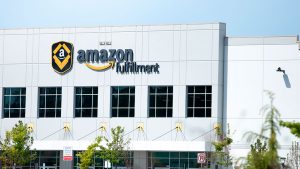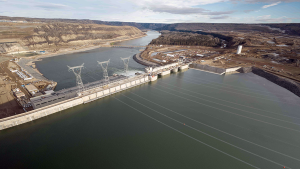A massive construction and expansion project completed at the Fairview Container Terminal in Prince Rupert, B.C., is in the spotlight and three companies that worked on the ambitious venture have won silver Vancouver Regional Construction Association (VRCA) 2018 Awards of Excellence.
Maksim Mihic, general manager of DP World (Canada) Inc. which operates the terminal, said he’s pleased the project is being recognized and that the companies are receiving accolades because they overcame substantial obstacles to ensure the venture was completed on time and also on budget.
“It is great news to be recognized,” said Mihic. “The project itself has positioned Fairview terminal as the second largest container facility in Canada.”
The project, officially called the Fairview Container Terminal Phase 2 North Expansion, was completed last fall and raised capacity to 1.35 million TEUs (twenty-foot equivalent units) from 750,000. Expansion work at the terminal began in 2015 and was completed over a two-year construction period. It included the development of a new berth expansion, upgrades to the existing caisson wharf, new mooring dolphin, new empty container stacking yard, and new container storage yards.
The footprint was also increased to 32 hectares, or 320,000 square metres, with the reclamation of 4.5 hectares, or 45,000 square metres, of land. The capacity was increased to support importers and exporters that favour Prince Rupert for its position to Asian and North American markets.
Two of the companies that worked on the project as a joint venture, Fraser River Pile & Dredge Inc. and BEL Contracting, won silver in the over $50 million category of the VRCA awards for their performance and Houle Electric Ltd. won silver in the electrical contractors $2 to $5 million category.
Mihic said DP World has long-standing relationships with each of the three companies that worked on the Fairview Container Terminal project and they deserve awards for the work they did.
“We have successfully completed expansion projects with this team in the past. They are all premier companies in their category — and not surprisingly, they delivered a quality product this time too.”
Mihic said the project started slowly and, initially, was behind, but the FRPD-BEL Gateway joint venture in particular developed a plan to put the project back on track so it was on time and on budget.
Piling on the project was particularly challenging due to the fact upper layers of rock were apt to crumble which, in turn, made drilling difficult because holes would collapse. However, the team adapted.
“As is typical with any project of this scale, piling was particularly challenging due to some unforeseen geotechnical issues,” said Mihic. “The team quickly identified the issues and solutions, so it did not affect delivery.”
Judges of the awards noted in their remarks that building on a working dock comes with its own set of challenges, including the simple fact that construction trucks can’t just come and go as they please.
“Not only did the project team manage these challenges, but they also found ways to contribute to their corporate social responsibility from employing local and First Nations workers (40 per cent of site manhours) to reusing crushed rock from blasting for backfill,” the judges said in their remarks.
Sarah Clark, president and CEO at FRPD, said the project site was very constrained because operations had to continue while construction work was underway in fenced-off areas at the terminal.
“They had to give up some of their operating space and we had very strict handover dates of when they could take over because all the time we were there we were restricting their TEU capacity.”
Ground conditions made drilling and piling difficult because the upper layers of rock weren’t structurally sound and would crumble and shift, she said.
“We had to adapt to that. The layers were not very cohesive and solid. That means they could collapse in when you start to drill.”
The work also had to be done in tight areas and trucks had to travel through town so the drivers had to be extra careful, noted Clark.
BEL Contracting was in charge of all the upland work at the project and rock was blasted from a hill behind the terminal. The crushed rock was used to fill in a portion of the shore to be able to expand the facility. Trucks were used and a conveyor was built over a railway line to move the rock into position. Teamwork was key to successfully managing the project.
“Co-operation, to me, was one of the most outstanding between the subcontractors and our joint venture partner,” said Clark. “Everybody was working for the project. They weren’t working for their own company. They were working for the good of the project. Sometimes you don’t see that co-operation.”
Judges noted that Houle Electric Ltd. faced a unique set of challenges working in a container terminal that’s in Canada’s wettest city. The company did substation upgrades, installed new electrical systems, and did infrastructure upgrades for four new container cranes and upgrades to existing cranes infrastructure, installed a new high mast-lighting system and radiation portal systems.











Recent Comments